Zoeken in deze blog 🔎🔎
zaterdag 2 december 2006
Nederland en Afghanistan 108
'Taliban Truce in District of Afghanistan Sets Off Debate.
KABUL, Afghanistan.
After a series of bruising battles between British troops and Taliban fighters, the Afghan government struck a peace deal with tribal elders in Helmand Province, arranging for a cease-fire and the withdrawal of both sides from one southern district. A month later, the ripples are still being felt in the capital and beyond.
The accord, reached with virtually no public consultation and mediated by the local governor, has brought some welcome peace for residents of the district, Musa Qala, and a reprieve for British troops, who had been under siege by the Taliban in a compound there for three months.
But it has sharply divided former government officials, legislators and ordinary Afghans.
Some say the agreement points the way forward in bringing peace to war-torn parts of the country. Others warn that it sets a dangerous precedent and represents a capitulation to the Taliban and a potential reversal of five years of American policy to build a strong central government. They say the accord gives up too much power to local leaders, who initiated it and are helping to enforce it.'
Lees verder:
http://www.nytimes.com/2006/12/02/world/asia/02afghan.html? hp&ex=1165122000&en=9f1cbff64133a7eb&ei=5094
&partner=homepage
Wijsheid 8
Chief Seattle. Suqwamish and Duwamish.
De Nuance van de NRC 9
'Sekszakenman kreeg jarenlang privileges.
Door onze redacteuren Tom Kreling Jan Meeus.
Amsterdam, 2 dec. De gemeente Amsterdam heeft seksondernemer Charles Geerts jarenlang een speciale behandeling gegeven bij de opbouw van zijn prostitutie-imperium op de Amsterdamse Wallen.
Afgelopen donderdag trok de gemeente alle vergunningen van Geerts in, omdat hij nauwe banden zou hebben met de onderwereld en zijn seksbedrijf zou gebruiken voor het witwassen van crimineel geld. Maar uit briefwisselingen tussen Geerts en de gemeente Amsterdam, die zijn ingezien door deze krant, blijkt dat de gemeente vanaf 1999 intensief met Geerts heeft samengewerkt.
De gemeente weet al sinds 1996 dat er criminele ondernemers actief zijn op de Wallen, stelt een woordvoerder. „We hadden echter nooit de bestuurlijke middelen om ze aan te pakken.”
Volgens Han Jahae, de advocaat van Charles Geerts, is er sprake van opportunisme bij de gemeente. „Alle informatie waarop de gemeente zich nu beroept, was al bekend”, aldus Jahae. „Toen de gemeente Geerts nodig had, vormde die informatie geen beletsel om zaken te doen.”
Hoe intensief de gemeente samenwerkte met de seksondernemer blijkt uit een deal in 2000. In ruil voor het sluiten van een peepshow op de Nieuwendijk kreeg Geerts vergunningen voor nieuwe prostitutiepanden op de Sint Annendwarsstraat in het hartje van de Amsterdamse Wallen.
Uit een brief van juli 2000 van de gemeente Amsterdam blijkt dat de stad zeer tevreden was over de samenwerking met Geerts: „Bij deze verklaar ik dat u geheel aan de gemaakte afspraken heeft voldaan.” Een soortgelijke afspraak werd gemaakt over de verplaatsing van een peepshow in de Reguliersbreestraat. In ruil hiervoor kreeg Geerts een vergunning voor een raambordeel op de Oudezijds Achterburgwal. Ook hiervoor moest het bestemmingsplan worden aangepast.
Een woordvoerder verklaart dat burgemeester Cohen niet betrokken is geweest bij specifieke vergunningsaanvragen. „De onderhandelingen met Geerts zijn altijd door het stadsdeel Centrum gedaan”, aldus een woordvoerder.
Een woordvoerder van het stadsdeel Centrum laat weten dat er „absoluut geen sprake” is geweest van een speciale behandeling van Geerts. Het stadsdeel wist al jaren dat „Geerts niet zuiver op de graat” is, maar het stadsdeel praat volgens de woordvoerder „met iedereen die een aanvraag indient”.
Zie: http://www.nrc.nl/binnenland/article562124.ece/
Sekszakenman_kreeg_jarenlang_privileges
Interessant is waarom de NRC niet meldt wat de reden is waarom 'De gemeente Amsterdam seksondernemer Charles Geerts jarenlang een speciale behandeling [heeft] gegeven bij de opbouw van zijn prostitutie-imperium op de Amsterdamse Wallen.' In de grote mensenwereld van oorzaak en gevolg geldt de vuistregel 'voor wat hoort wat.' Met andere woorden: welke ambtenaren zijn omgekocht om Geerts een 'prostitutie imperium' te laten opbouwen met een jaarlijks omzet van vele tientallen miljoen euro's? Of worden er alleen in de bouwsector ambtenaren omgekocht en krijgt in de prostitutiewereld een hoerenbaas op zijn eerlijke gezicht een 'speciale behandeling?'
Ikzelf woon in het Wallengebied van Amsterdam en al jarenlang doen de geruchten hier de ronde dat er ambtenaren worden omgekocht, waardoor nu nagenoeg het hele Wallengebied in handen van de onderwereld is. Onder andere drugsgeld wordt zo wit gewassen. Bij ons in de buurt wordt ook altijd lacherig gesproken over de ambtenaren van het nabijgelegen stadhuis. Zodra hun werktijd erop zit neemt de toeloop op de Wallen drastisch toe. Op weg naar het Centraal Station voor de trein naar de polder waar ze wonen, loopt een deel van de ambtenaren even langs de hoeren om te zien of ze nog aan hun gerief kunnen komen.Een tijdje geleden werd de gemeente door een actie van burgers uit de buurt teruggefloten nadat ambtenaren en politici de regels voor de seksbazen nog meer wilden versoepelen. Waarom deze autoriteiten dit wilden, is nooit echt duidelijk geworden.'Privileges' krijgt een mens nooit zomaar voor niets. Daarvoor moet in de wereld van alledag gedokt worden.
De NRC moet zijn huiswerk beter doen. De verslaggevers zouden moeten beginnen met het samenstellen van een lijstje van hoofdstedelijke ambtenaren die het afgelopen decennium betrokken zijn geweest bij corruptie-affaires. Waar zwart- en trouwens ook wit geld geld te verdelen is, is corruptie jongelui. Zo werkt de nuance in de grote mensenwereld. En al onderzoekende stuit men van het een op het ander. Dat weet ik uit eigen ervaring in de journalistiek. Aan de slag jongens. Want een beetje lezer van de krant blijft nu alleen met vragen zitten.
Geestig is ook het woord 'sekszakenman.' Zakenman is tegenwoordig een eerzaam beroep. Vroeger heette zo'n 'sekszakenman' gewoon souteneur of pooier, ieemand die leeft van de verdiensten van een prostituee. Het is net als de werkster van vroeger, die heet nu interieurverzorgster. In tegenstelling tot 'sekszakenman' is interieurverzorgster wel degelijk een eerzaam beroep. Dit om misverstanden te voorkomen. Het staat natuurlijk ook een stuk minder als de NRC geschreven had 'de pooier Charles Geerts,' zeker als die ook nog eens jarenlang privileges had genoten van onze democratisch gekozen volksvertegenwoordigers en hun ambtenarenapparaat.
In verband met het opkrikken van het jaarlijkse gemiddelde, is de politie in onze buurt druk doende niet om boeven te vangen of souteneurs te controleren, maar om boetes uit te delen aan mensen van wie het fietsachterlichtje niet functioneert. Zo kent iedere dienst zijn eigen prioriteiten. Dit beleid wordt al jaren gevolgd en ondanks de vriendelijke adviezen aan de politie op straat om nu eens boeven te gaan vangen, blijven ze zich halsstarrig fixeren op die fietslampjes. Passanten die een agent op zijn plichten wijzen, worden hautain genegeerd. Wij in de buurt begrijpen er niets meer van. Op de brug van de Kloveniersburgwal en de Oude Hoogstraat worden 's avonds aan de lopende band fietsers bekeurt terwijl op diezelfde plaats overdag drugdealers met rust worden gelaten. Het is en blijft een onoplosbaar raadsel.
Aangifte Strafbaar Feit 2
'Amsterdam, 24 maart 2006
Aan de Hoofdofficier van Justitie
van het Arrondissementsparket Amsterdam,
mr. L.A.J.M. de Wit
Geachte heer De Wit,
Ondergetekende doet hierbij aangifte van een strafbaar feit, te weten: schending van het internationaal recht door minister van Defensie Henk Kamp en de Nederlandse militairen die in de Afghaanse provincie Kandahar van terrorisme verdachte personen aan de Amerikaanse autoriteiten hebben overgedragen, terwijl algemeen bekend is dat deze bondgenoot in de zogeheten ‘war on terror’ stelselmatig de mensenrechten van deze categorie gevangenen schendt. Niet voor niets verklaarde de directeur onderzoek van het bureau Azië van de Amerikaanse mensenrechtenorganisatie Human Rights Watch tegenover de NRC dat ‘de Nederlandse troepen hiermee het risico lopen dat ze handelen in strijd met de mensenrechten.’ De Nederlandse advocaat dr. Liesbeth Zegveld, gespecialiseerd in oorlogsrecht, is nog explicieter wanneer zij stelt dat ‘Nederland het internationaal recht schendt.’ Zie daarvoor haar bijgesloten commentaar voor de NRC/ Handelsblad. Bovendien heeft minister Kamp zelf over het Amerikaanse beleid het volgende tegenover het Radio I Journaal verklaard: ‘Het is zo dat de Amerikanen een derde categorie gevangenen onderscheiden. Het gaat voor hen niet alleen om burgers en om militairen, maar het gaat ook om unlawful combatants waar ze over spreken. Nou, dat is niet onze uitleg van het Verdrag van Genève, dus wij denken dat het beste is als de Amerikanen dezelfde uitleg aan dat Verdrag geven als alle andere landen doen.’ De Radio I verslaggever vroeg de minister vervolgens: ‘Ja, dat wilt u graag, maar dat doen ze op dit moment nog niet. Dus is het geen risico dat als Nederlanders betrokken zijn bij zo’n arrestatie dat ze dan medeplichtig zijn aan dingen die u niet wilt?’ Minister Kamp antwoordde: ‘Maar het risico is nog veel groter als je terroristen maar laat lopen.’ Een opmerkelijke uitspraak aangezien in een rechtstaat een verdachte pas een terrorist is op het moment dat dit onomstotelijk door een onafhankelijke rechter na een eerlijk proces is bewezen geacht en niet wanneer een politicus dit meent. Erger nog: de minister impliceert met zijn opmerking dat omdat hij en de Amerikanen nu eenmaal vinden dat de verdachten terroristen zijn ze daarom aan een bondgenoot kunnen worden overgedragen, van wie bekend is dat deze het internationaal recht schendt. Voor alle duidelijkheid: minister Kamp gaat er dus impliciet vanuit dat 'terroristen' het gevaar mogen lopen te worden gemarteld. Immers ‘het risico is nog veel groter als je terroristen maar laat lopen.’ Zie hiervoor ook mijn weblog onder de rubrieken ‘Martelen’ en ‘De Nederlandse Terreur.’ http://stanvanhoucke.blogspot.com/ Ik citeer in dit verband ook Barbara Olshansky van het gezaghebbende Amerikaanse ‘Center for Constitutional Rights’ die in ‘Secret Trials and Executions’ over ‘military tribunals and the threat to democracy’ het volgende schrijft: ‘Declaring an “extraordinary emergency,” on November 13, 2001, President George W. Bush signed an unprecedented order authorizing the creation of special military tribunals to try non-citizens suspected of terrorism. While these tribunals or commissions may take place either inside or outside the United States, all such trials will be almost entirely outside of the cardinal constitutional guarantees embodied in the American criminal justice system. With a single wipe of his pen, President Bush replaced the democratic pillars of our legal system with that of a military commission system in which he, or his designee, is rule-maker, investigator, accuser, prosecutor, judge, jury, sentencing court, reviewing court, and jailer or executioner.’ Zie Seven Stories Press. ISBN: 1-58322-537-4 Een dergelijk regime, dat in strijd is met het internationaal recht, wordt mede mogelijk gemaakt door de impliciete en expliciete medewerking van de Nederlandse minister van Defensie en de betrokken Nederlandse militairen in Afghanistan. Vandaar mijn aangifte.
In afwachting van uw reactie,
Hoogachtend,
Stan van Houcke´
Zie ook: http://stanvanhoucke.blogspot.com/2006/11/nederlandse-leger-martelt.html
Omdat ik acht maanden niets vernam, zelfs niet eens een bericht van ontvangst kreeg, stuurde ik tot tweemaal toe een email aan de hoofdofficier van justitie in Amsterdam met het verzoek om een reactie:
'Dinsdag 28 november 2006:
geachte mevrouw Driel
sinds uw automatisch antwoord heb ik geen reactie van u mogen ontvangen.
in afwachting van een reactie
hoogachtend
stan van houcke
-----Oorspronkelijk bericht-----
Van: Driel, J. (Parket Amsterdam) [mailto:j.driel@om.nl]
Verzonden: vrijdag 17 november 2006 9:38
Aan: Stan van Houcke
Onderwerp: Out of Office AutoReply: aan hoofdofficier van justitie mr. l.a.j .m. de wit
Op dit moment ben ik niet aanwezig. Vragen, gestuurd aan ap-adam@openbaarministerie.nl, worden gewoon beantwoord.
Groeten,
Judith Driel'
Gisteren ontving ik de volgende brief van mevrouw R.K. Bhajan, medewerkster Beleid & Ondersteuning van het Arrondissementsparket Den Haag:
'Datum: 30 november 2006
Onderwerp: ontvangstbevestiging
Geachte heer Van Houcke,
Hierbij bericht ik u dat uw brief d.d. 24 maart 2006 door tussenkomst van het Arrondissementsparket Amsterdam door mij is ontvangen. Uw brief is geregistreerd onder bovenvermeld nummer.
Ik verwacht binnen zes weken een inhoudelijk oordeel te kunnen geven op uw verzoek.
Hoogachtend,
mw. R.K. Bhajan
Medewerkster Bedleid & Ondersteuning.'
Mijn eerste gedachte was, kijk eens aan, het heeft meer dan acht maanden geduurd en enkele aansporingen voordat een mevrouw van het Arrondissementsparket Den Haag de beleefdheid had om te reageren op mijn aangifte van een strafbaar feit. Mijn tweede gedachte was: ik hoop dat niet een medewerkster van de afdeling Beleid & Ondersteuning, die geen juridische titel heeft, mijn aangifte inhoudelijk gaat beoordelen. En toch schrijft mevrouw Bhajan dat zij verwacht dat binnen zes weken te gaan doen. Ik houd u op de hoogte.
De Partij van de Arbeid
'Een grote minderheid van de Nederlandse kiezers voelt zich sinds mei 2002 steeds meer ontheemd. Mensen zien met verbijstering hoe populisme zich meester heeft gemaakt van het politieke debat. Schamen zich voor de manier waarop in ons land mensen worden behandeld die hier bescherming zoeken. Maken zich grote zorgen over het feit dat Nederland met de rug naar Europa staat, in zichzelf gekeerd. Dat aan het onderwijs veel mooie woorden wijdt, maar weinig visie.
Daar moesten verkiezingen verandering in brengen. Met afgrijzen zagen de ontheemden hoe ook de PvdA liet gebeuren dat de verkiezingsdebatten zich versmalden tot eindeloos gekissebis over huren, voedselbanken en belastingen. Om je heen hoorde je ook de potentiële PvdA-kiezers zeggen: ’Het gaat nérgens over’, ’Wat kunnen mij die paar procent schelen, het gaat mij om de toekomst van mijn kinderen’…
Het punt is niet dat ’de kiezers’ veranderingsmoe zijn, integendeel, veel mensen snakken naar veranderingen – maar dan niet alleen de financieel-economische waarover het in deze campagne vrijwel uitsluitend ging. Oók de PvdA heeft de indruk gewekt dat de toekomst van Nederland zich alleen in Nederland afspeelt. Omdat Wouter Bos ’het feestje van Balkenende’ niet al te erg durfde te verstoren, hamerde hij erop dat het niet eerlijk was dat niet iedereen was uitgenodigd – in plaats van te benadrukken waarom er in veel opzichten helemaal geen réden was voor een feestje.
De PvdA zou zich opnieuw door de interpretatie van exitpolls en cirkeldiagrammen laten misleiden als zij concludeert dat conservatisme het wachtwoord is voor de komende jaren. Wie goed luistert, weet dat er juist een ongestilde behoefte is aan een verhaal met durf en visie dat verwoordt wat veel mensen vinden over de samenleving van vandaag en hun rol daarin. De grootste doelgroep voor een moderne PvdA zit bij de mensen die zich willen laten meenemen in zo’n overtuigend verhaal. Ze willen een partij die ingaat op hun zorgen over de wereld, en niet die over hun portemonnee.'
Lees verder: http://www.trouw.nl/deverdieping/podium/article561723.ece/
Verkiezingen_PvdA_durfde_niet_te_gaan_voor_inhoud_Opinie
vrijdag 1 december 2006
Martelen 62

'Black-hooded CIA paramilitaries tried to "disappear" German national.
By Joshua Holland Posted on November 29, 2006, Printed on November 30, 2006
I often give the commercial media a hard time, but it's important --
if we want a better media -- to give them a bit of praise when they
earn it. So let me offer kudos to the Washington Post's Dana Priest
for not mincing words in this lede:
Khaled al-Masri was supposed to have been disappeared by black-hooded
CIA paramilitaries in the dead of night. One minute he was riding a
bus in Macedonia, the next -- poof -- gone. Grabbed by Macedonian
agents, handed off to junior CIA operatives in Skopje and then
secretly flown to a prison in Afghanistan that didn't officially
exist, to be interrogated with rough measures that weren't officially
on the books. And then never to be heard from again -- one fewer
terrorist in the post-9/11 world.
Masri is now trying to use the courts to get a modicum of justice for
that treatment -- a radical idea, apparently, in the aftermath of 9/11:
…Masri is waiting to see if the judges will allow the CIA to
disappear him again.
This time, it's not the physical, flesh-and-blood, burly, ponytailed
German citizen with six kids whom the U.S. government wants to make
vanish from the face of the Earth. It's his legal case, his very
right to have his argument heard in open court, that the CIA is
seeking to have disappeared. They argue, citing the state-secrets
privilege, that to proceed with the case would damage national
security and that this damage outweighs any legal rights Masri may have.
The U.S. District Court for the Eastern District agreed with the
government in May.
If they have their way this time, the pale Justice Department lawyers
swaying back in their chairs before the three judges of the U.S.
Court of Appeals for the 4th Circuit would prohibit any judge and any
jury anywhere from ever hearing the arguments in Masri's six legal
pleadings and 40 exhibits, more than 1,000 pages in all. Much of the
evidence was unearthed by German prosecutors and European Parliament
investigators.
"Pale Justice Department lawyers swaying back in their chairs " --
there's a word-picture for you.
There are also the eight U.S. officials who confirmed to at least one
American reporter that Masri spent months in a dank Afghan cell
because a couple of CIA officials in Washington had a hunch he was
someone he was not and that they just didn't move fast enough when
they found out he wasn't.
Read the whole thing -- it's quite a tale.'
Lees verder: http://www.alternet.org/bloggers/joshua/
Cisca Dresselhuys

Cisca Dresselhuys: 'Geboren: in 1943 te Leeuwarden Samenwonend: met Koos Groen Familie: Cisca heeft nooit een kinderwens gehad
Wist u al over Cisca Dresselhuys...
dat ze nooit zonder make-up het huis uit gaat?
dat ze bewust niet getrouwd is? Ze krijgt al een claustrofobisch gevoel van het woord huwelijk.
dat ze op haar twaalfde al wist dat ze geen kinderen wilde en dat ze later journaliste wilde worden?
dat ze altijd tegen vrouwen zegt: ‘Als er apparaten in huis komen, leer die dan niet te bedienen. Mannen vinden dat leuk en die moet je lekker hun gang laten gaan’!
dat ze haar partner leerde kennen op de redactie van ‘Trouw’?
dat Cisca de dochter is van een dominee? Zie: http://www.omroepmax.nl/?waxtrapp=uconuCsHnHUZUsBsmBsqtWtevW
Uit de Volkskrant van vanochtend geplukt. Willem van Beusekamp: 'Ontuhullend is het interview ( door journaliste Geke van der Wal) met Koos Groen, de man van Cisca Dresselhuys. Haar partner heeft een hekel aan kinderen, "gejank en poepbroeken". Letterlijk: "Dan worden ze ouder, gaan ze hun eigen weg, en willen ze niks meer met je te maken hebben, dus nee, wat moet ik ermee.''
Gejank en poepbroeken van luitjes die zich later ook nog eens van je afkeren. Wat een schraal mens- en wereldbeeld heeft dat stel. En toch was zij onvoorstelbaar lang de hoofdredactrice van een feministisch maandblad, het boegbeeld van de vrouwenbeweging. Dat geeft te denken, dames en heren. Of denkt u: 'nee, wat moet ik ermee.' Willem van Beusekamp eindigt zijn boekbespreking met: 'Anders gezegd: de vrouw die beroemde mannen zo streng de maat neemt over de huishouding, heeft zelf nooit aan den lijve ondervonden hoe het is om kinderen op te voeden. Een magere +1!'
Klimaatverandering 62
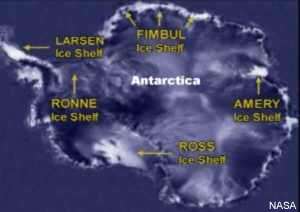
SCIENTISTS working in Antarctica fear the Ross Ice Shelf, an ice platform the size of France, could collapse quickly and trigger a rapid rise in sea levels.
A research team drilling in the frozen continent has recovered three million years of climate history, New Zealand newspaper The Press reported today.
An analysis of sea floor samples near Scott Base suggested the Ross Ice Shelf had collapsed before, probably suddenly.
Scientist Tim Naish said the sediment record gave crucial evidence about how the Ross Ice Shelf would react to climate change.
"If the past is any indication of the future, then the ice shelf will collapse," he told the newspaper.
"If the ice shelf goes, then what about the West Antarctic Ice Sheet? What we've learnt from the Antarctic Peninsula is when once buttressing ice sheets go, the glaciers feeding them move faster and that's the thing that isn't so cheery."
Antarctica stores 90 per cent of the world's water, with the the West Antarctic Ice Sheet holding an estimated 30 million cu km.
In January, British Antarctic Survey researchers predicted that its collapse would make sea levels rise by at least 5m, with other estimates predicting a rise of up to 17m.
Mr Naish, a sedimentologist with the Institute of Geological and Nuclear Sciences, said the team was retrieving a detailed history of the ice shelf.
"We know from the Larsen Ice Shelf (which collapsed on the Antarctic Peninsula in 2002) that they go extremely quickly," he said.'
Nederland en Afghanistan 107
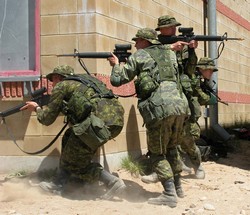 Amnesty International:
Amnesty International:'Afghanistan: NATO must ensure justice for victims of civilian deaths and torture.
NATO leaders must set up a joint body, together with partners in Afghanistan, to pursue justice for civilians whose human rights may have been violated by the NATO-led International Security Assistance Forces (ISAF) in Afghanistan, said Amnesty International ahead of the NATO summit in Riga, Latvia on 28/29 November. Amnesty International is concerned that the legal basis for the presence of ISAF in the country places it outside Afghan law and beyond the effective reach of justice in members' own countries. "ISAF has a crucial role to play in securing the rule of law in Afghanistan. We urge NATO leaders to ensure that ISAF does not fall short of international humanitarian and human rights law in pursuing this aim," said Tim Parritt, Deputy Asia Pacific Director at Amnesty International."Any civilians who may have suffered human rights violations in the course of ISAF operations deserve to receive justice and we call on NATO to lead the establishment of a body to investigate such claims, ensure the prosecution of those found responsible, and ensure reparation for the victims."Amnesty International is particularly concerned that:Aerial bombardments carried out as part of ISAF military operations have resulted in the killing of civilians, according to reports. These attacks may have failed to discriminate between civilians and military targets. These operations have also contributed to the displacement of up to 90,000 people who have fled their homes because of the violence.Detention procedures currently used by ISAF may be resulting in the torture or ill-treatment of Afghan nationals who are handed over to Afghan security forces known to use such practices.NATO should create a joint body together with its Afghan partners and the UN Assistance Mission to Afghanistan (UNAMA) to pursue justice for human rights violations such as these. The body could draw on the Trust Fund called for in UN Security Council Resolution 1386 (2001) to make any reparations to victims. NATO members should ensure that ISAF complies fully with international law in the course of its operations and should cooperate with UNAMA and the Afghanistan Independent Human Rights Commission in doing this. ISAF should pay particular attention to its arrest and detention procedures, including the handing over of detainees to Afghan custody. Amnesty International has for many years raised concerns about the use of torture and ill-treatment by Afghan security forces, including the National Security Directorate.For more information, please see: http://web.amnesty.org/library/index/engasa110202006'
Irak 126
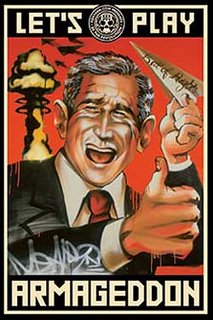 De Washington Post bericht:
De Washington Post bericht:'Iraq Study Group to Call for Pullback . But Iraq panel has no timetable.
The Iraq Study Group, which wrapped up eight months of deliberations yesterday, has reached a consensus and will call for a major withdrawal of US forces from Iraq, shifting the US role from combat to support and advising, according to a source familiar with the deliberations.
But the recommendation includes a series of conditions and qualifications that would govern any drawdown of forces, the source said. "It describes a process by which combat brigades could be pulled out, but there wasn't a specific timetable on it," he said. The source demanded anonymity because members of the bipartisan panel have been pledged to secrecy until the report is officially issued Dec. 6.
The issue of a timeline for drawing down troops - both a specific date to begin a withdrawal and the pace - had been major points of contention within the panel. The Bush administration has firmly rejected specifying a date for withdrawal, but Democrats have favored setting a time frame as a way to put pressure on the Iraqi government.
The recommendations in the still-secret report were agreed to after three days of closed-door discussions. The report, which is about 100 pages, will offer a comprehensive look at regional political and security issues as well as the troubled U.S. deployment in Iraq, according to sources close to the panel.
For weeks, the panel has debated reaching out to both Syria and Iran, an approach that the Bush administration has so far firmly rejected. Commission members have also backed the idea of a regional conference to bring all the neighbors into the process of stabilizing Iraq.
Contents of the panel's report were disclosed yesterday evening by the New York Times.
Under the recommendations of the commission, led by former secretary of state James A. Baker III and former congressman Lee H. Hamilton (D-Ind.), the emphasis of the U.S. military presence in Iraq would shift from fighting the insurgency and containing sectarian violence to backing up Iraqi security forces dealing with those problems.
This approach would place less emphasis on combat operations and more on logistics, intelligence and training and advising Iraqi units. Also, a large residual combat force would be required to protect all the personnel involved in those operations and to provide a security guarantee to the Iraqi government.
Thus, even if the combat forces were withdrawn, the person familiar with the group's thinking noted, the recommendation envisions keeping in Iraq a "substantial" U.S. military force.
Some people knowledgeable about the group's deliberations said it might be possible in a year or two to halve the U.S. military presence, to about 70,000 troops. Earlier reports that said that the group simply had decided to call for withdrawing combat forces from Iraq were "garbled," the source familiar with the panel's recommendations added. "It wasn't as specific as that, and it was a lot more conditional," he said. He declined to discuss those conditions.'
Lees verder:
http://www.truthout.org/docs_2006/113006Z.shtml Of:
http://www.washingtonpost.com/wp-dyn/content/article/2006/11/30/AR2006113000025.html
De Moderne Staat
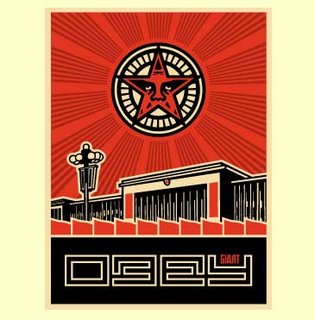
Dit is het resultaat van de combinatie neoliberalisme en sociaal democratie. De Independent bericht:
'Lord Ramsbotham exclusive: Justice system is absurd. Broken. Chaotic.
The former prison chief lambasts a justice system in meltdown after Tony Blair's decade of failure on crime and punishment.
Yesterday's announcement that the prison population now exceeds 80,000 is the latest low point in what one can only describe as the Government's headlong and self-induced race to absurdity as far as the conduct of imprisonment is concerned.
The reasons for this dreadful figure are not hard to find. If you produce legislation that results in longer prison sentences, more people will be in prison. If you do not resource prisons, to enable them to conduct work, education and training, prisoners are more likely to reoffend, as proved by the fact that the reoffending rate among adult males has gone up from 55 per cent to 67 per cent in the past five years. If you continue to have a dysfunctionally organised prison service, you will continue to have dysfunctional organisation of an overstretched system. And so on.
Many people have been warning the Government about this for years but, instead of listening to those with practical experience, it has preferred to take advice from people who know nothing about running large organisations, let alone an operational service. When, as now, the whole is run by a home secretary who, within weeks of taking office, publicly described the Home Office and the overburdened immigration service as not being fit for purpose, and recently disparaged the probation service to prisoners in Wormwood Scrubs, you do not exactly have a recipe for getting out of what is an increasingly dire situation. Leaders undermine the morale of their own troops at their peril. If, at the same time, you continue to bombard them with a continuous torrent of flawed legislation, much of which replaces previous legislation before the ink on it is dry, you create a mess that can only be cleared up by long-term planning, based on discussion with those who understand not only what needs to be done but how it might be done. That requires ditching current plans that are marching the whole system into even greater chaos.'
Lees verder: http://news.independent.co.uk/uk/crime/article2026812.ece
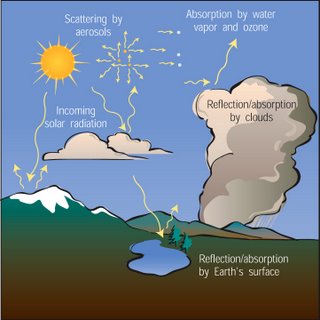
What we can do about passing the energy tipping point.
The energy tipping point has been reached, just as a system such as the climate has been found to have a critical threshold that some scientists believe has probably been reached. Obviously, climate disaster is much more ominous than the enormous consequences of passing the energy tipping point. As if it's a matter of choice, there are those who don't want to see any concerns about energy supply distract us from the climate challenge. Yet, the two crises are related and inseparable. There happens to be a common approach to mitigate each of them.
Meanwhile, the mainstream corporate press is finally hinting at limitations on the economy from the "constraints" of both climate and energy. This is heresy for free marketeers who believe in endless growth. The New York Times ran a guest editorial column on Nov. 29 that said,
The world’s supply of cheap energy is tightening, and humankind’s enormous output of greenhouse gases is disrupting the earth’s climate. Together, these two constraints could eventually hobble global economic growth and cap the size of the global economy. The most important resource to consider in this situation is energy, because it is our economy’s “master resource” -- the one ingredient essential for every economic activity. (Thomas Homer-Dixon's op-ed, "The End of Ingenuity")
When such an observation is combined with available evidence, such as overpopulation, we know that the dye has been cast, years before: economic growth will end soon, forever, on the scale the world has known. But there are those who imagine energy decline with little change in today's trajectory of technological growth and anything connected to it. They know about peak oil, but they understand it superficially.
There is almost always, like in the Times piece, the suggestion that coal will come along in a big way to provide energy. The feasibility of this, apart from climate-damage concerns, is questionable because of our petroleum infrastructure and the nature of petrocollapse. Yet, the same Times piece helpfully introduced the concept of net energy from energy extraction, and even though the issue was presented simplistically, the reality of energy decline becomes a little more apparent to the public.
The science/art of oil being supplied to the market ought to be a major consideration applied to the focus on the tightening, geological limit of crude oil. There are many other factors, such as the depletion of desirable, retrievable crude versus all categories of hydrocarbon deposits that are more and more the heavy and solid varieties. And when we look at energy alternatives, there is no evidence of their major readiness for a globally charged market -- unless we could snap our fingers and see this economy back to maybe its size of 1930, when petroleum started taking over many aspects of modern life for a much smaller population of humans and cars.'
De Dollar Hegemonie 16

Long-term threat of 'trade chaos' cited.
WASHINGTON -- Renewed fears that the Chinese central bank may be poised to start liquidating its $1-trillion stash of U.S. dollars briefly drove the greenback to a 20-month low against the euro and a two-year low against the British pound in trading yesterday.
The euro surged to $1.3172 (U.S.) against the greenback and the pound to $1.9469, before losing ground by day's end. The loonie and the yen have also gained on the U.S. dollar in recent days.
The sudden weakness of the U.S. dollar began late last week, soon after Chinese officials suggested that holding a lot of dollars might be a losing investment strategy. Investors read that as a signal that the massive trade and financial imbalances between Asia and the U.S. may be about to unwind.
The chief worry is that if China's central bank -- the largest foreign holder of U.S. dollars -- begins to unload its reserves, the dollar will plunge. With China's yuan effectively pegged to the dollar, other leading currencies would move higher after the realignment.
The Globe and Mail
There's no evidence yet that's what China is actually doing. But few investors want to be the ones left holding dollars when the plunge comes. "People are getting very nervous," said Andrew Busch, chief foreign exchange strategist at BMO Nesbitt Burns in Chicago.
"It's a wonderful behavioural science experiment and it's being played out with billions of dollars. The first to get out tips the scales."
Central banks in Russia and in some Middle Eastern countries have already announced plans to cut their U.S. dollar holdings.'
http://www.theglobeandmail.com/servlet/story/
The New York Times
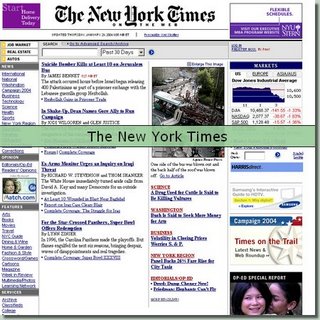 Als u wilt weten hoe de Nederlandse commerciele massamedia aan hun berichtgeving komen, dan kunt u net zo goed uzelf meteen gratis abonneren op de New York Times. Dan krijgt u het nieuws uit de eerste hand en bovendien is de NYT breder geinformeerd dan de steeds provincialer berichtende Nederlandse massemedia. Leest u deze email:
Als u wilt weten hoe de Nederlandse commerciele massamedia aan hun berichtgeving komen, dan kunt u net zo goed uzelf meteen gratis abonneren op de New York Times. Dan krijgt u het nieuws uit de eerste hand en bovendien is de NYT breder geinformeerd dan de steeds provincialer berichtende Nederlandse massemedia. Leest u deze email: 'Van: NYTimes.com [mailto:insidenytimes@nytimes.com]
Onderwerp: @Times: Enroll in the Free Times Reader Beta Today
@TIMES - Inside NYTimes.com
Thursday, November 30, 2006
-----------------------------------------
Dear @ Times Subscriber,
We want to give you the opportunity to be among the first to
experience Times Reader, a new application which enhances the
onscreen reading experience.
Embrace the easy-to-read format
Times Reader uses the same font and column structure you see
in the printed paper. Also, there is no scrolling necessary -
- just use the arrow keys on your keyboard to turn the page.
Read it offline
In just about one minute you can sync up Times Reader to the
Web site to retrieve the latest news and photos.
Don't miss a thing
"What's Read" allows you to quickly see how much of the paper
you've read and lets you easily navigate to unread articles.
Browse the "News in Pictures"
View a slide show with all of today's photos and click on a
specific photo to read the related article.
Make it your own
Use tools to save, print and e-mail documents. You can also
highlight and annotate passages within the text of articles.
Read it anywhere
TimesReader automatically adjusts to fit any screen size,
from an ultra mobile computing device to a ten-foot display.
Download the Times Reader today. It's free!
http://firstlook.nytimes.com/index.php?cat=4&excamp=mkt_attimesreadertext
Sincerely,
The NYTimes.com Marketing Team
donderdag 30 november 2006
Klimaatverandering 61
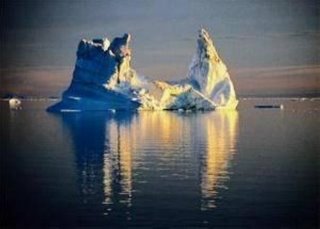 'Jeremy Leggett Intertwines Peak Oil and Climate Change. ~~~ By Rob Hopkins, Transition Culture / Energy Bulletin
'Jeremy Leggett Intertwines Peak Oil and Climate Change. ~~~ By Rob Hopkins, Transition Culture / Energy BulletinJeremy Leggett. Peak Oil, climate change, and the daunting arithmetic of carbon fuels.
The Fifth International Conference of the Association for the Study of Peak Oil and Gas.
By the time Jeremy Leggett stepped up to the podium, I was starting to wonder whether I was the only person in the conference who had ever heard of climate change. We had heard Hirsch telling us with a straight face that we should dig up all the tar sands and turn all the coal into petrol, and Bauquis arguing that we needed 3,000 new nuclear power plants. I am used to people arguing for climate change solutions with no peak oil awareness but rarely the other way round. Leggett told it like it is, and convincingly and with great urgency weaved the argument that peak oil and climate change are in fact, two sides of the same problem. You can see the Powerpoint of his talk here.
“This talk will look at peak oil in the context of climate change, the conflagration of two huge problems, what we might think of as the Two Great Oversights of our times. They are certainly the two biggest problems we face, and they have an interesting set of comparisons. The biggest single difference is that excepting the USA, there is pretty much a consensus on climate change now, whereas peak oil is still a minority view, although it is certainly less so thanks to the work of ASPO. It has moved from being a hobbyist issue to a more general one.
Part of my work is advising the Government. I don’t know of a single UK Government official who is worried about it. The main linking theme is that the survival technologies are the same, alternative energy and efficiency, which need to be fast tracked. We need to be able to trigger the survival reflex.
4.5 billion years ago there was carbon without life. Then the atmosphere began to change. Oil was created 150 and 90 million years ago. I would like to offer a history of our recent past.
1859. Man drills oil for the first time, in Pennsylvania.
1914. World by this stage is already running on oil.
1930. Peak year of discovery in US48, although no-one knew it at the time. 1956. Hubbert predicts that lower-48 US oil production will peak in 1971. 1965. Peak of world oil discovery. 1973. The first oil crisis hit, a huge shock despite being only a 9% drop, by then we also knew that Hubbert was right. 1978. The second oil crisis, triggered by the Iranian Revolution. Led to a real fear of depression, but 3 things came to our rescue, fresh oil supplies coming in, new reserves and no long food supply chains, none of which we have to fall back on this time round. 1981. The crisis was over and it was a peak year for the construction of refineries, rigs and pipelines. 1985. Doubts begin. You mean we’re not sure? The OPEC upwards revisions. 1989. Jim Hansen, climate scientist of NASA tells a Congressional committee “it is time to say that global warming is here”. It was a year of droughts and fires, but he was vilified and got no support. Also in this year the IPCC released its first authoritative report. Margaret Thatcher said “this is a report that will change our lives, instead of crying out for oil it will one day be crying out for water”. 1990. World Climate Change conference, every daily paper carried headlines relating to the subject, such as “Race to Save our World”. 1992. The energy around climate change had largely dissipated by now. At the Rio Summit 160 world leaders discussed climate change but produced a climate convention with no teeth. They concluded “we must stabilise them at levels that pose no threat and be able to feed ourselves, our ecosystems, our economies”. The US was the only nation that didn’t want legally binding targets.'
Lees verder: http://www.energybulletin.net/19769.html
Martelen 60
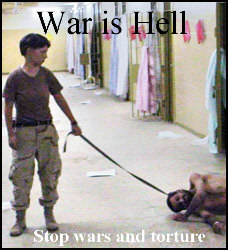 'Report: 11 EU Countries Knew of Secret CIA Prison.
'Report: 11 EU Countries Knew of Secret CIA Prison.Germany and 10 other states knew about secret CIA prisons in Europe, and obstructed investigations into the case, the European Parliament said in a report.
There were 11 European countries that knew about secret US jails for terror suspects and obstructed the investigation into the transport and illegal detention of prisoners within Europe, a European Parliament committee said in a draft report on Tuesday.
"Many governments cooperated passively or actively (with the CIA)," the committee's rapporteur Claudio Fava said. "They knew."
The draft, which was based on classified documents and secret informants, noted at least at least 1,245 suspicious flights through European air space or stopovers at European airports that took place at the request of the CIA.
The report was the result of an investigation by a special committee of the European Parliament into "extraordinary rendition" -- the US practice of transporting terrorist suspects to third countries for questioning.
Extraordinary rendition
Bildunterschrift: Human rights groups accuse the United States of having used extraordinary rendition in order to interrogate suspected terrorists under methods not allowed in the US itself, including torture.
The German government has dismissed the report, which came out Tuesday. The EU committee also claimed Austria, Great Britain, Italy, Poland, Sweden, Ireland, Spain, Portugal, Greece and Cyprus knew about the prisons.
The report urged officials in the individual EU countries to start their own investigations as to whether their governments have broken European human rights accords with their use of extraordinary rendition.
It also criticizes EU foreign policy chief Javier Solana and anti-terror coordinator Gijs de Vries, accusing them of having given incomplete statements to the investigating committee.'
Les verder: http://www.dw-world.de/dw/article/0,2144,2251920,00.html
Amerikaanse Oorlogsmisdaden 34
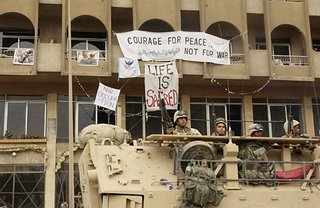 'Impeachment Hearings for Bush & Co.? How about War Crimes Tribunals.
'Impeachment Hearings for Bush & Co.? How about War Crimes Tribunals.While Bush administration members have made a sport of breaking the law, both domestically and internationally, their intransigence will come back to haunt - one way or another.
11/28/06 "HW" -- -- The Bush Doctrine of taking "the battle to the enemy," for example, is a direct repudiation of the United Nations Charter, which prohibits the use of international force unless in self-defense (after an armed attack across an international border) or related to a UN Security Council decision. And that explains why Bush's 2002 National Security Strategy makes a point to "protect Americans" from "the potential for investigations, inquiry, or prosecution" by the International Criminal Court "whose jurisdiction does not extend to Americans and which we do not accept."
The whole idea of the US being able to preemptively attack other nations was penned by White House lawyers two weeks after 9/11; former justice department lawyer John Yoo wrote memos for then-White House counsel Alberto Gonzales arguing that "no limits" stood in the way of Bush's ability to take military action and that "the president's decisions are for him alone and are unreviewable."
But giving someone like Bush "unreviewable" and unlimited military powers is reckless; the man can barely construct a sentence, let alone articulate a humane and effective foreign policy.
Besides, a "no limits" approach to foreign policy can't coexist with rule of law, which explains why just last week, US Homeland Security Secretary Michael Chertoff accused the United Nations and other world bodies of using international law "as a rhetorical weapon against us." Chertoff co-authored the infamous Patriot Act but is best known for his stunning incompetence regarding Katrina. If only he had been as eager to protect Americans from hurricanes as he is to protect them from global treaties...
Chertoff's view of international law as a threat to the US is supported by Rumsfeld's 2005 National Defense Strategy, which notes: "Our strength as a nation state will continue to be challenged by those who employ a strategy of the weak using international fora, judicial processes and terrorism.
In other words, the Pentagon links "judicial processes" with "terrorism," and sees "judicial processes" as weakening the US "nation state." What kind of nonsense is that?
Now that Rumsfeld has "resigned" and Bush and Co. face their lame-duck years watching the war on terror implode, it's worth considering the aftermath of World War II, when the International Military Tribunal indicted and tried over 20 Nazi leaders for war crimes ranging from waging a war of aggression, killing civilians, mistreating prisoners and plundering property. How eerily familiar those charges seem today.
And how ominous that only weeks ago, German prosecutors began pursuing a criminal investigation into the alleged role of Rumsfeld, Attorney General Alberto Gonzales, former CIA director George Tenet and numerous other administration members regarding prisoner abuse at Abu Ghraib and Guantánamo.
Rumsfeld will lose his legal immunity when he ceases to be Defense Secretary, a fact which must weigh heavily on Bush and others. Unsurprisingly, the administration has taken pre-emptive action against future war crimes charges, including pushing through the scandalous Military Commissions Act, which provides them retroactive domestic protection from prosecution regarding prisoner abuse cases.'
Lees verder: http://www.informationclearinghouse.info/article15759.htm Of:
http://www.heatherwokusch.com/index.php?name=News&file=article&sid=96
The Empire 70

Dit is het product van de massale inzet van veramd uranium wapens door onze NAVO-bondgenoten, de Verenigde Staten en het Verenigd Koninkrijk.
'Richard N. Haass is President of the Council on Foreign Relations. From Foreign Affairs, November/December 2006.
Summary: The age of U.S. dominance in the Middle East has ended and a new era in the modern history of the region has begun. It will be shaped by new actors and new forces competing for influence, and to master it, Washington will have to rely more on diplomacy than on military might.
THE END OF AN ERA
Just over two centuries since Napoleon's arrival in Egypt heralded the advent of the modern Middle East -- some 80 years after the demise of the Ottoman Empire, 50 years after the end of colonialism, and less than 20 years after the end of the Cold War -- the American era in the Middle East, the fourth in the region's modern history, has ended. Visions of a new, Europe-like region -- peaceful, prosperous, democratic -- will not be realized. Much more likely is the emergence of a new Middle East that will cause great harm to itself, the United States, and the world.
All the eras have been defined by the interplay of contending forces, both internal and external to the region. What has varied is the balance between these influences. The Middle East's next era promises to be one in which outside actors have a relatively modest impact and local forces enjoy the upper hand -- and in which the local actors gaining power are radicals committed to changing the status quo. Shaping the new Middle East from the outside will be exceedingly difficult, but it -- along with managing a dynamic Asia -- will be the primary challenge of U.S. foreign policy for decades to come.
The modern Middle East was born in the late eighteenth century. For some historians, the signal event was the 1774 signing of the treaty that ended the war between the Ottoman Empire and Russia; a stronger case can be made for the importance of Napoleon's relatively easy entry into Egypt in 1798, which showed Europeans that the region was ripe for conquest and prompted Arab and Muslim intellectuals to ask -- as many continue to do today -- why their civilization had fallen so far behind that of Christian Europe. Ottoman decline combined with European penetration into the region gave rise to the "Eastern Question," regarding how to deal with the effects of the decline of the Ottoman Empire, which various parties have tried to answer to their own advantage ever since.
The first era ended with World War I, the demise of the Ottoman Empire, the rise of the Turkish republic, and the division of the spoils of war among the European victors. What ensued was an age of colonial rule, dominated by France and the United Kingdom. This second era ended some four decades later, after another world war had drained the Europeans of much of their strength, Arab nationalism had risen, and the two superpowers had begun to lock horns. "[He] who rules the Near East rules the world; and he who has interests in the world is bound to concern himself with the Near East," wrote the historian Albert Hourani, who correctly saw the 1956 Suez crisis as marking the end of the colonial era and the beginning of the Cold War era in the region.
During the Cold War, as had been the case previously, outside forces played a dominant role in the Middle East. But the very nature of U.S.-Soviet competition gave local states considerable room to maneuver. The high-water mark of the era was the October 1973 war, which the United States and the Soviet Union essentially stopped at a stalemate, paving the way for ambitious diplomacy, including the Egyptian-Israeli peace accord.
Yet it would be a mistake to see this third era simply as a time of well-managed great-power competition. The June 1967 war forever changed the balance of power in the Middle East. The use of oil as an economic and political weapon in 1973 highlighted U.S. and international vulnerability to supply shortages and price hikes. And the Cold War's balancing act created a context in which local forces in the Middle East had significant autonomy to pursue their own agendas. The 1979 revolution in Iran, which brought down one of the pillars of U.S. policy in the region, showed that outsiders could not control local events. Arab states resisted U.S. attempts to persuade them to join anti-Soviet projects. Israel's 1982 occupation of Lebanon spawned Hezbollah. And the Iran-Iraq War consumed those two countries for a decade.'
Lees verder:
http://www.foreignaffairs.org/20061101faessay85601/richard-n-haass/the-new-middle-east.html?mode=print
Irak 125
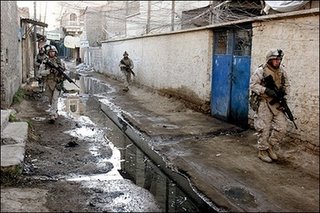

The five-page report, written in August, focuses on the largely Sunni Iraqi province of Al-Anbar, according to the Washington Post.
As of mid-November the problems remained the same, a senior US intelligence official told the Post. "The fundamental questions of lack of control, growth of the insurgency and criminality" remain the same, said the official, speaking on condition of anonymity.
According to the report, "the social and political situation has deteriorated to a point" that US and Iraqi troops "are no longer capable of militarily defeating the insurgency in al-Anbar," the Post reported.
The secret report was written by Marine Colonel Peter Devlin, a senior military intelligence officer with the Marine Expeditionary Force in the region. According to the Post, it did not appear to have been shared with Iraq's military.
Iraq's Sunni population is "embroiled in a daily fight for survival," fears "pogroms" by the Shiite majority, and is increasingly dependent on Al-Qaeda in Iraq as its only hope against growing Iranian dominance in Baghdad, the report reads.
"From the Sunni perspective, their greatest fears have been realized: Iran controls Baghdad and Anbaris have been marginalized," says the report, according to the Post.
Barring an additional 15,000 to 20,000 US troops deployed to the region in addition to billions of dollars in aid, "there is nothing" US troops "can do to influence" the insurgency, the report reads.'
Eric Hoffer

De Amerikaanse schrijver Eric Hoffer: 'There is no telling to what extremes of cruelty and ruthlessness a man will go when he is freed from the fears, hesitations, doubts and the vague stirrings of decency that go with individual judgement. When we lose our individual independence in the corporateness of a mass movement, we find a new freedom- freedom to hate, bully, lie, torture, murder and betray without shame and remorse. Herein undoubtedly lies part of the attractiveness of a mass movement.'
Nederland en Afghanistan 106
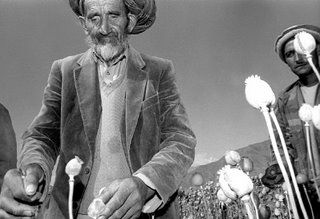 In het kader van de Nederlandse militaire steun aan de democratische opbouw van Afganistan of iets dergelijks wordt er weer flink verdiend aan de heroinehandel.
In het kader van de Nederlandse militaire steun aan de democratische opbouw van Afganistan of iets dergelijks wordt er weer flink verdiend aan de heroinehandel.'War on drugs strengthens Afghan mafia.
By Rachel Morarjee in Kabul.
Afghanistan’s war on drugs has been marred by corruption that has
strengthened the grip of an increasingly powerful mafia on the
country’s narcotics trade, a report by the World Bank and United
Nations said.
Over the past five years, the British-led counter-narcotics strategy
had penalised the country’s poorest farmers and strengthened networks
of organised crime, consolidating the trade among a tiny elite of
traffickers, the damning report said.
"Around 25 to 30 key traffickers, the majority of them based in
southern Afghanistan, control major transactions and transfers,
working closely with sponsors in top government and political
positions."
Afghanistan’s interior ministry, which oversees the police, had been
"captured" by powerful traffickers and was used to facilitate the
drugs trade.
"Those driving the drug industry must be brought to justice and
officials who support it sacked," said Antonio Maria Costa, executive
director of the UN Office of Drugs and Crime.
"Interdiction efforts especially need to target high-level profiteers
whose wealth magnifies their potential for corrupting the state," the
report said.
Strategies aimed at short-term reductions in opium production in the
worst affected areas could do more harm than good, fuelling
"discontent and strengthening the insurgency in the volatile south of
the country".
Far from leading to sustained declines in total national cultivation,
a successful reduction in one province often led to increases
elsewhere, or cultivation in the province itself rebounded the
following year, such as in Helmand province after 2003.
To achieve long-term success in the battle against drugs eradication,
the report found that efforts should be concentrated in the six
Afghan provinces where there was relatively little opium cultivation
to build up a line of defence against the spread of the trade. "Rural
development programmes are needed throughout the country and should
not be focused primarily on opium areas, to help prevent cultivation
from further spreading," said Alastair McKechnie, World Bank country
director for Afghanistan.
Efforts to eradicate opium crops had strengthened corruption by
giving police an opportunity to collect bribes, which hit hardest the
poor farmers and labourers who could not afford to pay off authorities.
"Wealthier opium producers pay bribes to avoid having their crops
eradicated, greatly reducing the effectiveness of counter-narcotics
measures and gravely undermining the credibility of the government
and its local representatives," the report said.
Afghanistan produced a record opium harvest in 2006, with total
cultivation increasing by 59 per cent and production by 49 per cent.
The bulk of opium growth this year was concentrated in Helmand and a
few other highly insecure and insurgency-ridden provinces in the south.
Even in this record year, opium took up less than 4 per cent of the
total cultivated area in Afghanistan, with only an estimated 13 per
cent of the population involved in poppy cultivation, which the
report said was cause for hope.'
Zou de minister van Defensie, de oud-wethouder van Borculo Henk Kamp, dit allemaal beseffen of is hij nog naiever dan algemeen wordt aangenomen.
De Neoliberale Speculanten
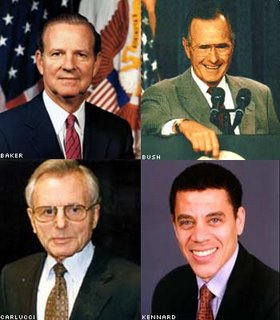
De VNU is een van de grote uitgeverijen van de wereld, en van Nederlandse origine, bekend geworden door de uitgave van onder andere veel damesbladen, Donald Duck, de Nieuwe Revu, Panorama etc. Het was altijd een succesvol concern, maar ook de VNU is in handen gevallen van de neoliberale speculanten. En dan begint het grote plunderen.
De Volkskrant bericht:
'VNU fors op verlies door rentelasten.
Van onze verslaggever Nico Goebert.
AMSTERDAM - Het informatieconcern VNU is diep in de rode cijfers beland na de overname door een zestal opkoopfondsen een half jaar geleden. De resultaten van het van oorsprong Nederlandse concern worden gedrukt door hoge rentelasten.
Over het derde kwartaal leed VNU een verlies van 89 miljoen euro vergeleken met een winst van 50 miljoen euro in dezelfde periode van 2005. Over de eerste negen maanden van dit jaar kwam het verlies uit op 132 miljoen euro, vergeleken met een winst van 93 miljoen over de eerste drie kwartalen van 2005.
VNU, dat zijn geld verdient met het verzamelen en verkopen van markt- en media-informatie, werd op 23 mei van dit jaar voor 7,6 miljard euro gekocht en van de beurs gehaald door Valcon, een investeringsvehikel van de opkoopfondsen Carlyle Group, Blackstone, Thomas H. Lee, KKR, Hellman & Friedman uit de VS en Alpinvest uit Nederland.
Deze groep financierde de overname voor een groot deel met bankleningen die op de balans van VNU zijn komen te staan. De schuldenlast van VNU is daardoor explosief gestegen. Direct na de overname steeg de schuldenlast tot 6,6 miljard euro. Aan het eind van het derde kwartaal was dat 6 miljard.
De vermindering was, zo gaf financieel directeur Rob Ruijter toe in een toelichting op de cijfers, vooral te danken aan de koersdaling van de dollar in het derde kwartaal. De schulden van VNU luiden in dollars, maar het concern rapporteert zijn resultaten in euro’s.
De rentelasten over deze leningen drukken de cijfers van VNU in het rood. In het derde kwartaal boekte VNU een bedrijfsresultaat van 72 miljoen euro, bijna een kwart minder dan in dezelfde periode van 2005. Maar in dezelfde drie maanden betaalde VNU ook 131 miljoen euro aan rente aan de banken. Over de eerste negen maanden bedroegen de rentelasten 218 miljoen euro.'
Lees verder:http://www.volkskrant.nl/economie/article374730.ece/
VNU_fors_op_verlies_door_rentelasten
De Volkskrant spreekt eufemistisch van 'een investeringsvehikel van de opkoopfondsen.' Dit is in feite nonsense. Want er wordt niet geinvesteerd, dat blijkt nu juist uit het artikel, maar gespeculeerd over de rug van het concern heen. En wat die 'opkoopfondsen' betreft, dat is het moderne kapitalisme-kapitaal dat niet meer investeert in uitbreiding van concerns, maar in de handel met lucht. Kapitaal kan in het neoliberale model namelijk niet stil in een bank blijven liggen. Het moet permanent in beweging zijn, zwoegen, winst maken. De dwang van de groei. Als het systeem niet groeit, is het in verval. Stilstand is achteruitgang. Dus moet men er iets mee doen. Investeren in nieuwe bedrijven, of als er sprake is van overproductie (het eeuwig terugkerende probleem van het kapitalisme) dan moet ermee gespeculeerd worden, in panden, racepaarden of bedrijven het maakt niet uit. Alles is verkoopbaar.
Ik geef u een simpel voorbeeld. In het begin van de jaren tachtig zag ik hoe de Amsterdamse onderwereld in de Koepelzaal van het Sonesta Hotel met een schaars goed als woningen speculeerde. Op die manier konden ze hun geld witwassen. Zo kochten ze bijvoorbeeld om acht uur 's avonds een pand voor 100.00 gulden op en verkochten het een uur later voor 180.000 gulden. Ineens was het pand 80.000 gulden in waarde gestegen, zonder dat er ook maar iets aan was veranderd. Hetzelfde gebeurt nu met de VNU. Speculeren, het is wat de gek op de vrije markt ervoor geeft. Maar men kan ook misgokken en dan gebeurt er wat in de Volkskrant wordt gemeld.
Wat de Volkskrant niet meldt over de Carlyle Groep en Osama bin Laden en Bush senior en de drie andere, hierboven geportretteerde, vooraanstaande Amerikaanse politici die bij deze speculanten groep betrokken zijn of waren, kunt u hier lezen: http://en.wikipedia.org/wiki/Carlyle_Group En hier:
http://www.publicintegrity.org/pns/report.aspx?aid=424
Het is dit neoliberale speculanten model, de handel in lucht, dat het kabinet Balkenende volgde. Ik ben benieuwd hoe de SP en de PvdA, als ze met het CDA in zee gaan, dit ideologisch model willen doorbreken. De banken aan banden leggen? De pensioenfondsen en andere institutionele beleggers? Want die zijn de financiers van deze speculanten. Denkt u dat het beide partijen zal lukken deze machtige heren aan banden te leggen? Of denkt u dat zo'n kabinet de koers van pappen en nathouden gaat volgen?
Interessant is overigens dat de economische elite in het Westen zich ineens druk maakt over de klimaatverandering. Deze elite heeft ontdekt dat de klimaatverandering desastreus uitwerkt voor de neoliberale ideologie, waarbij de meerderheid voor de winsten van een bijzonder kleine minderheid werkt. Bovendien wordt de positie van de westerse economische elite in toenemende mate bedreigt door de fabelachtige Chinese economische ontwikkelingen. De Chinezen maken zich nauwelijks druk over de milieuvernietiging en kunnen ook daardoor goedkoper produceren. Dat beseft ook de westerse economische elite en dus hamert men nu op milieuwetten. Alleen zo kan men straks de overheid dwingen om de Chinese importen aan banden leggen.
woensdag 29 november 2006
Martelen 59

Zodra de macht zich zwak voelt verdwijnen de beschermende wetten. Zo is het altijd geweest onder elk systeem, ook het parlementair democratische.
De NRC bericht:
'EU-voorzitter zocht regeling CIA-acties.
Brussel, 29 nov. Oostenrijk heeft als fungerend EU-voorzitter in mei van dit jaar aan de Verenigde Staten voorgesteld een regeling te treffen voor de zogeheten renditions, het in het geheim vervoeren van terreurverdachten.
Een vertegenwoordiger van de Oostenrijkse regering deed de suggestie tijdens een ontmoeting met John Bellinger, een hoge functionaris van de Amerikaanse regering. Dat blijkt uit een geheim verslag van de bijeenkomst, dat is ingezien door leden van het Europees Parlement. Een kopie van het verslag is in het bezit van deze krant. Bellinger antwoordde tijdens de bijeenkomst dat de VS moesten „nadenken” over het voorstel.
Volgens Kathalijne Buitenweg (GroenLinks) is duidelijk dat hoge EU-functionarissen, onder wie buitenlandcoördinator Javier Solana, zaken hebben achtergehouden. Zij is lid van een commissie van het europarlement die de verhalen over geheime vluchten en gevangenissen onderzoekt.
„Er is structureel overleg geweest tussen de EU en de VS. Dat is merkwaardig, want Solana zei eerder dat er slechts één keer over het onderwerp was gesproken, met Condoleezza Rice, de Amerikaanse minister van Buitenlandse Zaken”, aldus Buitenweg.
Gisteren presenteerde de Italiaanse europarlementariër Giovanni Claudio Fava namens de onderzoekscommissie een nieuw rapport. Daarin stelt hij dat Europese regeringen moeten hebben geweten van het bestaan van geheime gevangenissen. Fava noemt Groot-Brittannië, Polen, Italië en Duitsland bij naam. Nederland niet.
In september erkende de Amerikaanse president Bush het bestaan van geheime gevangenissen. Volgens Fava is er „ernstig indirect bewijs” dat er in Polen een geheime gevangenis voor terreurverdachten is geweest. Verder stelt hij dat er ten minste 1.245 geheime vluchten hebben plaatsgevonden boven Europees grondgebied.'
Zie: http://www.nrc.nl/buitenland/article558909.ece/EU-voorzitter_zocht_regeling_CIA-acties
Verarmd Uranium 4

 Poison Dust
Poison Dust*A NEW LOOK AT U.S. RADIOACTIVE WEAPONS.
**Join us in a campaign to expose and stop the use of these illegal weapons*
On November 1, the BBC reported that the U.S. and British governments
have continued to use radioactive and chemically toxic Depleted Uranium
weapons in Iraq, disregarding warnings that these weapons pose a cancer
risk and are linked to numerous other health issues.
According to the article, a report by a senior UN scientist said
research showing how depleted uranium could cause cancer and other
health problems was suppressed in a recent World Health Organization report:
But Dr Keith Baverstock, who worked on the project, ...described a
process known as genotoxicity, which begins when depleted uranium
dust is inhaled. "The particles that dissolve pose a risk - part
radioactive - and part from the chemical toxicity in the lung," he
said. Later, he said, the material enters the body and the blood
stream, potentially affecting bone marrow, the lymphatic system and
the kidneys. The research was not included in the WHO report, and
Dr Baverstock believes it was blocked.
During the current Iraq War the U.S. use of radioactive DU weapons
increased from 375 tons used in 1991 to 2200 tons. Geiger counter
readings at sites in downtown Baghdad record radiation levels 1,000 and
2,000 times higher than background radiation. The Pentagon has bombed,
occupied, tortured and contaminated Iraq. Millions of Iraqis are
affected. Over one million U.S. soldiers have rotated into Iraq. Today,
half of the 697,000 U.S. Gulf War troops from the 1991 war have reported
serious medical problems and a significant increase in birth defects
among their newborn children.
The effects on the Iraqi population are far greater. Many other
countries and U.S. communities near DU weapons plants, testing
facilities, bases and arsenals have also been exposed to this
radioactive material which has a half-life of 4.4 billions years.'
Irak 123
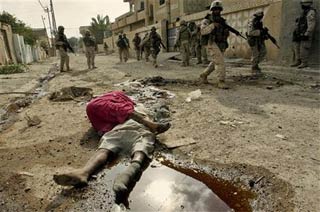 De Guardian bericht: 'They lied their way into Iraq. Now they are trying to lie their way out.
De Guardian bericht: 'They lied their way into Iraq. Now they are trying to lie their way out.Bush and Blair will blame anyone but themselves for the consequences of their disastrous war - even its victims
11/27/06 "The Guardian" -- -- 'In the endgame," said one of the world's best-ever chess players, José Raúl Capablanca, "don't think in terms of moves but in terms of plans." The situation in Iraq is now unravelling into the bloodiest endgame imaginable. Both popular and official support for the war in those countries that ordered the invasion is already at a low and will only get lower. Whatever mandate the occupiers may have once had from their own electorates - in Britain it was none, in the US it was precarious - has now eroded. They can no longer conduct this war as they have been doing.
Simultaneously, the Iraqis are no longer able to live under occupation as they have been doing. According to a UN report released last week, 3,709 Iraqi civilians died in October - the highest number since the invasion began. And the cycle of religious and ethnic violence has escalated over the past week. The living flee. Every day up to 2,000 Iraqis go to Syria and another 1,000 to Jordan, according to the UN's high commissioner for refugees. Since the bombing of Samarra's Shia shrine in February more than 1,000 Iraqis a day have been internally displaced, a recent report by the UN-affiliated International Organisation for Migration found last month.
Those in the west who fear that withdrawal will lead to civil war are too late - it is already here. Those who fear that pulling out will make matters worse have to ask themselves: how much worse can it get? Since yesterday American troops have been in Iraq longer than they were in the second world war. When the people you have "liberated" by force are no longer keen on the "freedom" you have in store for them, it is time to go.
Any individual moves announced from now on - summits, reports, benchmarks, speeches - will be ignored unless they help to provide the basis for the plan towards withdrawal. Occupation got us here; it cannot get us out. Neither Tony Blair nor George Bush is in control of events any longer. Both domestically and internationally, events are controlling them. So long as they remain in office they can determine the moves; but they have neither the power nor the credibility to shape what happens next.'
Lees verder: http://www.guardian.co.uk/comment/story/0,,1957695,00.html
Klimaatverandering 60

Common Dreams bericht: 'Scientists: Climate Change Clues in Sky.
Scientists are peering into the clouds near the top of the world, trying to solve a mystery and learn something new about global warming.
The mystery is the droplets of water in the clouds. With the North Pole just 685 miles away, they should be frozen, yet more of them are liquid than anyone expected.
So the scientists working out of a converted blue cargo container are trying to determine whether the clouds are one of the causes — or effects — of Earth's warming atmosphere.
"Much to our surprise, we found that Arctic clouds have got lots of super-cooled liquid water in them. Liquid water has even been detected in clouds at temperatures as low as minus 30 degrees Celsius (minus 22 F)," said Taneil Uttal, chief of the Clouds and Arctic Research Group at the Earth Systems Research Laboratory of the U.S. National Oceanic and Atmospheric Administration (NOAA).
"If a cloud is composed of liquid water droplets in the Arctic, instead of ice crystals, then that changes how they will interact with the earth's surface and the atmosphere to reflect, absorb and transmit radiation," said Uttal.
"It's a new science, driven by the fact that everybody doing climate predictions says that clouds are perhaps the single greatest unknown factor in understanding global warming."
With NASA reporting that 2005 was the warmest year on record worldwide, the debate over global warming marches on, but not here. The American and Canadian scientists at the Eureka Weather Station in the northern Canadian territory of Nunavut, like the Inuit who are seeing their native habitat thaw, are beyond questioning the existence of climate change.'
Lees verder: http://www.commondreams.org/headlines06/1127-07.htm
De Israelische Terreur 126
 'Carter: Israeli 'domination' over Palestinians is 'atrocious'.
'Carter: Israeli 'domination' over Palestinians is 'atrocious'.Former Democratic President Jimmy Carter called Israeli "domination" over Palestinians "atrocious" during an interview Monday on ABC's Good Morning America, RAW STORY has learned.
Appearing on the morning talk show to promote his new book, Palestine Peace Not Apartheid, Carter dismissed criticism by some Democrats that his book comes down too harshly on America's key ally in the Middle East.
Robin Roberts told Carter that "many people find surprising that you come down a little hard on Israel, and that there have been some key Democrats who have distanced themselves a little bit from your view on Israel."
"In fact, House Speaker Nancy Pelosi said 'it is wrong to suggest that the Jewish people would support a government in Israel or anywhere else that institutionalizes ethnically based suppression, and Democrats reject that allegation vigorously,'" Roberts said. "What is your response to that?"
"Well, Robin, I have spent the last 30 years trying to find peace for Israel and Israel's neighbors, and the purpose of this book is to do that," Carter responded. "But you can't find peace unless you address the existing issues honestly and frankly."
Carter said that there was "no doubt now that a minority of Israelis are perpetuating apartheid on the people in Palestine, the Palestinian people."'
Lees verder: http://www.rawstory.com/news/2006/
Carter_Israeli_domination_over_Palestinian_atrocious_1127.html
Iran 68
 Robert Scheer:
Robert Scheer:'Learning to Live With the Ayatollahs.
How in the world did George W. Bush manage to turn Ayatollah Ali Khamenei, the “Supreme Leader” of “Axis of Evil” Iran, into a prophet of peace in the Middle East?
That is the disturbing question that must be asked after Iraq’s president journeyed this week to plead for support from what was previously described by the White House as one of the world’s most menacing rogue regimes.
The White House is desperately twisting itself into knots to find a way out of an Iraq debacle sure to top the political agenda in the ’08 presidential election. Having idiotically dug ourselves a terribly deep hole in Iraq—remember when protesters against the war were mocked for using the word “quagmire”?—Bush is now forced to beg Syria and Iran to throw us a rope.
As the Bush-appointed and James Baker-led Iraq Study Group has telegraphed, the cooperation of these two pariah states is essential to an effective exit strategy. In reality, this is not so much a change in policy as it is an acknowledgment of a truth-on-the-ground that has been clear since the invasion 44 months ago: Our sworn enemies were the biggest beneficiaries of our overthrow of Iraq’s secular dictatorship.
We should call this the Boomerang War. Bush threw it, but it keeps coming back and hitting us all on the head. A defanged secular dictatorship has been replaced with the anarchy of a deadly civil war between competing bands of religious fanatics. The most likely model now is Iranian-style theocracy as the majority Shiite population has turned to political parties and armed militias groomed, trained and nurtured by the fundamentalist ayatollahs across the Iranian border. Confirmation of this militant Shiite takeover was provided in a confidential memo by White House National Security Advisor Stephen Hadley (posted Wednesday on The New York Times website), stating that Prime Minister Maliki has been either ineffective in opposing or secretly supporting the takeover of Baghdad by fanatical Shiite militias.'
Lees verder:
http://www.truthdig.com/report/item/
20061128_robert_scheer_learning_to_live_with_the_ayatollahs/
Irak 122
 Blaming the Victim heet het. Eerst dring je het huis van een ander binnen, maakt daar een geweldige rotzooi en tenslotte zeg je dat het de bewoners hun schuld is.
Blaming the Victim heet het. Eerst dring je het huis van een ander binnen, maakt daar een geweldige rotzooi en tenslotte zeg je dat het de bewoners hun schuld is.From troops on the ground to members of Congress, Americans increasingly blame the continuing violence and destruction in Iraq on the people most affected by it: the Iraqis.
Even Democrats who have criticized the Bush administration's conduct of the occupation say the people and government of Iraq are not doing enough to rebuild their society. The White House is putting pressure on the government of Prime Minister Nouri al-Maliki, and members of the bipartisan Iraq Study Group have debated how much to blame Iraqis for not performing civic duties
This marks a shift in tone from earlier debate about the responsibility of the United States to restore order after the 2003 invasion, and it seemed to gain currency in October, when sectarian violence surged. Some see the talk of blame as the beginning of the end of U.S. involvement.
"It is the first manifestation of a 'Who lost Iraq?' argument that will likely rage for years to come," said Bruce Hoffman, a Georgetown University expert on terrorism who has worked as a U.S. government consultant in Iraq.
Americans and Iraqis are increasingly seeing the situation in different terms, said retired Army Col. Jeffrey D. McCausland , who recently returned from a visit to Iraq. "We're just talking past each other," he said, adding that Americans are psychologically edging toward the door that leads to disengagement. "We're arguing about 'cut and run' versus 'cut and jog.'''
Israelisch Expansionisme 32
 De slogan van het Jewish National Fund is: 'Take Pride In Our Past, Be Part Of Our Future.' Zie: http://www.jnf.org/site/PageServer
De slogan van het Jewish National Fund is: 'Take Pride In Our Past, Be Part Of Our Future.' Zie: http://www.jnf.org/site/PageServerIk citeer dit omdat het zo illustrerend is voor het feit dat het machtige JNF de Israelische terreur uit het verleden en de huidige terreur van de 'joodse natie' weigert te erkennen.
In de aangrijpende documentaire serie 'Route 181' van de Palestijn Michel Khleifi en de Joods Israeli Eyal Sivan wordt een zionistische rondleider van een museum in Israel van het Joods National Fund geinterviewd. Hij zegt over het mogelijk verdwijnen van de Palestijnen in zowel Israel als Gaza en de Westbank het volgende: 'It would get rid of a serious problem. One that preoccupies us. If we had done in 1948 as the Americans did with the Indians, then for everyone it would be... One lot would be gone and couldn't complain and the others, us, would be living in peace. But it was different and we must live with it.'
Deze functionaris van het Jewish National Fund zegt dit in het openbaar, publiekelijk laat hij weten dat een genocide van de Palestijnen beter was geweest voor Israel. Deze woorden komen uit de mond van een joods Israeli, die weet hoe de geschiedenis van de joden in Europa eindigde. Meer dan een decennium geleden interviewde ik de Israelische schrijver Amos Oz. Tijdens het interview spraken we over Ariel Sharon. Oz zei dat het volk van Sharon niet met een of ander moreel schoonmaakmiddel was besproeid maar met Zyklon B gas. Ik beaamde wat de schrijver zei, maar vroeg hem wel of hij nog enig vertrouwen had in de werkzaamheid van de Verlichtingsidealen, gezien het feit dat de mens kennelijk niet van de geschiedenis leert. Oz zweeg daarop.
Voor de documentaireserie zie: http://www.jerusalemites.org/jerusalem/cultural_dimensions/69.htm
The Empire 69

Stock markets on both sides of the Atlantic lurched downward yesterday as retail anxieties clouded the American economy and the US currency slipped closer to a rate of $2 against the pound.
In London, the FTSE 100 index dropped to its lowest close in seven weeks, losing 72 points to 6,050 in spite of upbeat UK housing data.
A more dramatic sell-off took place in America. The Dow Jones Industrial Average slumped 158 points to 12,121, its biggest fall for four months. The broader S&P 500 fell by 1.3% and the technology-dominated Nasdaq index lost 2.2%, hit by a sudden downturn in Google's shares.
Economists expressed renewed concern about American consumer spending after a dismal trading update from the world's biggest retailer, Wal-Mart.
Wal-Mart predicted that its November like-for-like sales would be down by 0.1% - its first monthly drop for 10 years - as it struggles to persuade shoppers to look beyond deeply discounted, one-off bargains on toys and electrical goods. Its update eclipsed better news from department stores and upmarket retailers which said shoppers had come in greater numbers over the Thanksgiving weekend.'
Partij voor de Dieren? 2
 De Partij voor de Dieren leidt aan hetzelfde euvel als de winkel in damesceintuurs die ik dit weekeinde zag op de Parijse Rue de Sèvres. Na een minuut heb je het wel gezien. Het onverdoofd castreren van kleine biggetjes is inderdaad een weerzinwekkende daad, en moet ogenblikkelijk worden verboden. Maar hoe nu verder met de armoede in de wereld, de gevolgen van de klimaatverandering of de oorlog in Irak? De fractievoorzitster van de PvdD kan bij deze wezenlijke onderwerpen hooguit haar betoogje afsluiten met de woorden ‘en overigens ben ik van mening dat biggetjes niet onverdoofd gecastreerd mogen worden, gelijk Cato zijn betogen beeindigde met: ‘Overigens ben ik van mening dat Carthago verwoest moet worden!’ Nu we toch in het oude Rome zijn beland, wist u dat keizer Caligula zijn lievelingspaard Incitatus tot senator wilde benoemen? Dat is pas dierenliefde!
De Partij voor de Dieren leidt aan hetzelfde euvel als de winkel in damesceintuurs die ik dit weekeinde zag op de Parijse Rue de Sèvres. Na een minuut heb je het wel gezien. Het onverdoofd castreren van kleine biggetjes is inderdaad een weerzinwekkende daad, en moet ogenblikkelijk worden verboden. Maar hoe nu verder met de armoede in de wereld, de gevolgen van de klimaatverandering of de oorlog in Irak? De fractievoorzitster van de PvdD kan bij deze wezenlijke onderwerpen hooguit haar betoogje afsluiten met de woorden ‘en overigens ben ik van mening dat biggetjes niet onverdoofd gecastreerd mogen worden, gelijk Cato zijn betogen beeindigde met: ‘Overigens ben ik van mening dat Carthago verwoest moet worden!’ Nu we toch in het oude Rome zijn beland, wist u dat keizer Caligula zijn lievelingspaard Incitatus tot senator wilde benoemen? Dat is pas dierenliefde!
Arrest Them and Throw Them Out, in a little Boat
https://x.com/ianmiles/status/2016143168694362516 Ian Miles Cheong @ianmiles BREAKING: Spain is fast tracking a decree to pass the legaliz...

-
Ziehier Yoeri Albrecht, die door een jonge journalist van het mediakanaal Left Laser betrapt werd tijdens een privé-onderonsje met twee ...
-
Juno Sara Alexandra, mijn kleindochter. Mag ik u voorstellen aan: Immanuel Maurice Wallerstein ( New York , 28 september 1930 ) een ...
-
En weer een generatie joodse slachtofferisten, nu nog Israelische kinderen, die verwensingen schrijft op Israelische bommen die Libanese l...


 'Bury my heart in the Green Zone.
'Bury my heart in the Green Zone.

